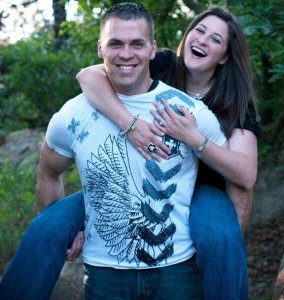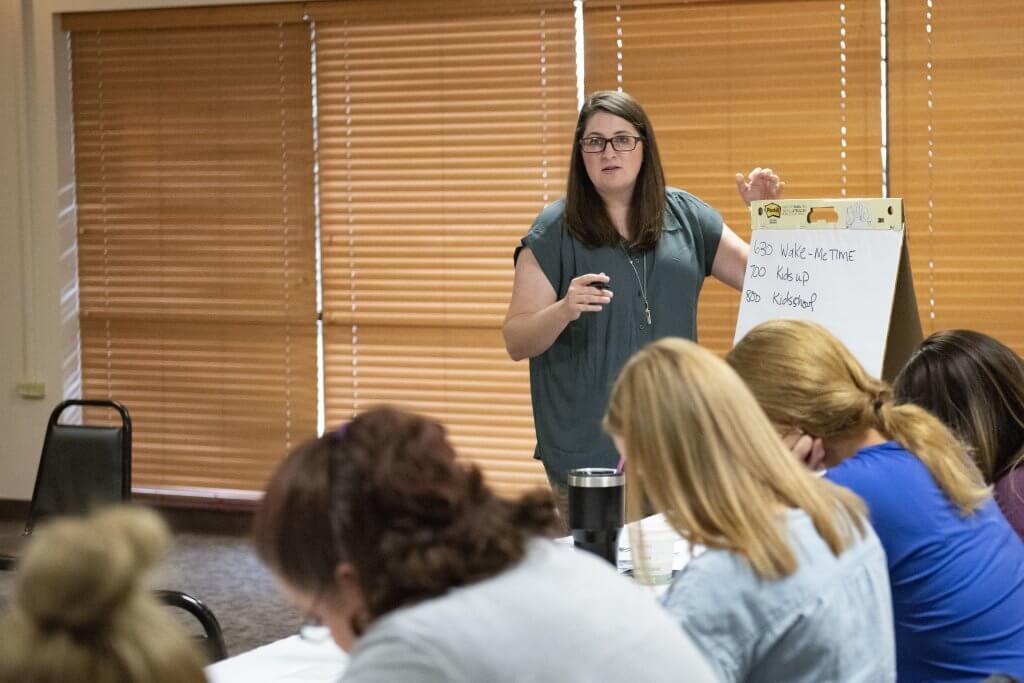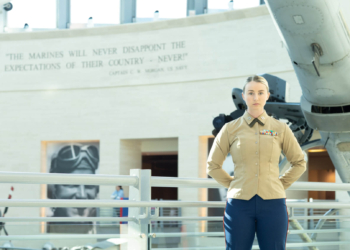There are an estimated 5.5 million military caregivers in the U.S., of which 19.6% are caring for Post-9/11 veterans, according to Hidden Heroes: America’s Military Caregivers. And Brittany Boccher is among those who found themselves in an unexpected role after the effects of combat lingered into their home.

Boccher still remembers the hope she felt about the future when she became a new Air Force spouse. The couple had a quick introduction to the demands of a military career when her husband, Adam, deployed overseas for six months shortly after getting married. Being separated so soon after exchanging vows was hard, but she was resilient — a word that would come to define her journey with military life.
She marked off the days of that deployment, counting down as their homecoming date drew near. Sleeping the night before was so hard, she recalls, images of his face and having him in her arms again filled her with anticipation. What she didn’t know is that she lost the man she married the second his boots touched the sands of Afghanistan.
Adam returned a shell of himself in January of 2007, no longer the outgoing and happy man she knew before he deployed. He was startled by loud sounds, became emotionally detached, and had frequent nightmares. Those nightmares were often violent, with him lashing out at her in their bed. Brittany knew something was horribly wrong and begged him to get help. He assured her he just needed time to readjust and that the things they were going through were private, not for anyone else to know about.
She’d become his secret keeper — a role with a weight so heavy she hardly kept from suffocating in it. From the outside looking in, their family was just fine, but internally the parts of her husband that she fell in love with were slowly stripped away by war and his recurrent work trauma. She was on a constant train of dealing with his emotional detachment, chronic pain, and now obvious debilitating symptoms of post-traumatic stress disorder.

More combat deployments and trauma came, taking even more from their already fragile marriage. Through it all she worked, cared for their two children — one of which has special needs — and volunteered every moment she could. She was the one everyone else came to for help, not knowing that she was desperate for it herself. For 10 years she concealed the devastating changes in her husband that were consuming them, until she couldn’t protect his secret any longer.
[See “Airman recounts painful aftermath of life after TBI”]
This summer, her husband retired after 20 years in the Air Force. But, those two decades came at a high price that will impact the rest of their lives. Adam was diagnosed with a traumatic brain injury, neuro-vestibular injuries, chronic PTSD, and REM Sleep Behavior Disorder. They found support through the Air Force Wounded Warrior Program, which not only supports his health needs but also Brittany’s as a caregiver.

In this new role, she has become empowered to be Adam’s voice when he needs it, which includes being hyperaware of his physical, emotional and mental health changes so she can head off potential anxiety attacks. As his caregiver, she often attends his medical appointments to help relay changes in his health, as his brain injuries have caused short-term memory loss and may impact what he remembers. His wounds may be invisible but they are deep.
The secret that was once slowly drowning them in the dark has now brought them up to the light. The Bocchers have been sharing their story publicly with the goal of reaching struggling military families. Though their life today is not the one she dreamed about on that long-ago wedding night, she has found purpose in what their new normal is. The days are long, hard and exhausting, but through it all, she is re-learning the warrior she fell in love with.
To learn more about Brittany’s workshops to empower military spouses, visit Discovering Your Spark.
If you are a military or veteran caregiver, the following organizations provide support and resources:
Air Force Wounded Warrior Program
American Red Cross Military and Veteran Caregiver Network
Read comments







































